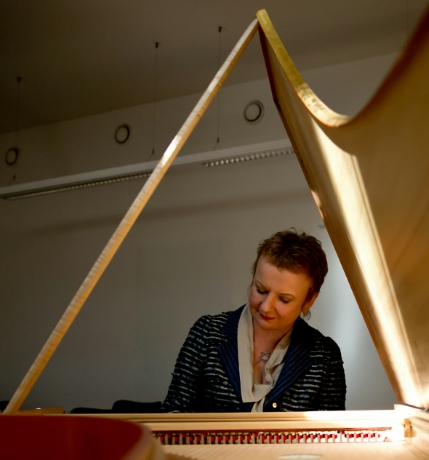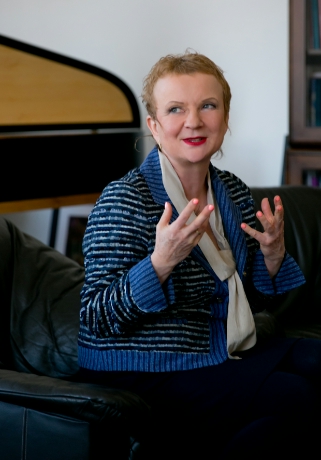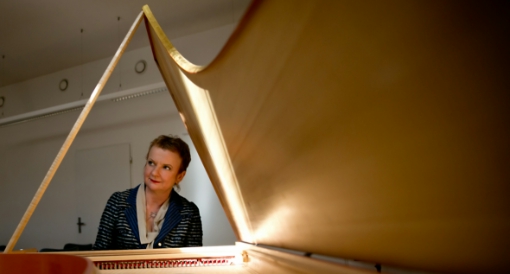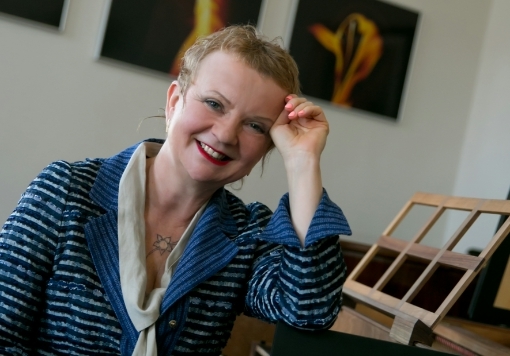I talked to Barbara Maria Willi, the dean of the Faculty of Music at the Janáček Academy of Performing Arts, dramaturge, teacher, populariser of classical music, harpsichordist, organist and specialist on the hammered dulcimer, about the 20th anniversary edition of the music series Barbara Maria Willi presents..., as well as about historically informed interpretation and further plans. The fact that she was actively teaching a foreign student just before our talk is the best indication of how busy her schedule is.
The 20th anniversary edition of the Barbara Maria Willi presents... How did it all start? What gave you the idea to organize such a series of concerts of early music in Brno?
I’ve always wanted there to be a dedicated series focused on historically informed performances. I wanted people to be able to see how different and adventurous it is, and that enlightened performance practice offers a much broader and different experience of music than what happens in mainstream music. I was subsequently approached by David Dittrich, based on a collaboration we had during the Concentus Moraviae festival, for which I had begun to prepare the dramaturgy, to see if I would like to start such a subscription series. It was also the first early music subscription series in Brno. I immediately agreed enthusiastically, and then he came up with the idea that this programme should have a distinctive and personal style: that I should present it and it should also bear my name. I was a bit afraid of this at first and wondered if it was too much, but it turned out to be part of the magic of this series. Not only is it intensely personal, but when I invite a foreign performer, people trust me that it will be an excellent and interesting guest. They know that even the dramaturgy is always revelatory or special in some way. Twenty years on, I’m proud of the series and I’m very happy that there is this large group of listeners who are willing and able to take on big challenges, often regarding unusual instruments and the like.

Were there always six concerts in the cycle, or did the number of concerts vary?
Always six – three in the first half of the year and three in the second half. In addition, it was always divided by calendar year, which is a little different from the traditional cycles.
Do you have a coherent dramaturgy for the cycle? Has it changed over the years?
The unifying principle is that I also participate as a performer in two or three concerts during the year. I also try to accentuate the international overlap, so I like to invite a lot of foreign guests, but I also focus on young and talented Czech ensembles. It’s not thematically bound, but in recent years there have been some less usual areas of early music, such as medieval or renaissance, or, on the contrary, romanticism, where we hear, for example, Schumann’s works interpreted on the hammered dulcimer.
...that’s what I was just about to ask. If we look at this year’s programme, we see composers from the 17th to the early 20th century. How broadly do you view so-called “early music”? How far do you think it goes?
With the “revival” of early music in the 1980s, people were excited about discovering something new about music from, say, the period from Monteverdi to Bach. And then they also started to get interested in Renaissance music, medieval music, all the way up to Gregorian chant. And a little later we started to come back closer to the present, so people like Nikolaus Harnoncourt, who I studied with, started to discover how Haydn, Mozart, and Beethoven were played. But we didn’t stay there either, and we went even further into Romanticism. We discovered that even at that time it was played very differently than we had originally thought. That’s also why today’s young ensembles don’t have an imaginary boundary in their heads. For example, for Pura Corda, a Greek-Spanish string quartet, early music ends roughly with Janáček. That means more or less the end of the use of gut strings for string instruments.
Do you base your dramaturgy on the proportionality of the individual periods? This year, for example, the Renaissance is not represented, but it has been at previous editions. Do you also take this into account?
The actual compilation of the dramaturgy is multilevel. I primarily base it on the possibilities of the top performers I am trying to get for the cycle. These ensembles usually have some kind of musical profile behind them, and I try to accommodate that. Of course, I also make sure that the particular edition is always varied and that the whole spectrum of early music is shown. So some editions go deeper into the past, while others concentrate more on Mozart, Beethoven, and other composers closer to our time. The third variable is the variety of instruments, or the variety of approaches – this year, for example, we have an exceptional guest from Paris, Philippe Bernold, playing the modern flute. As a typical Frenchman, he knows the Baroque tradition very well. On a modern instrument, he is able to achieve an almost traverse-like sound. So I try to introduce such interesting things in the dramaturgy to achieve a kind of natural inner story of the whole cycle.
How long does the preparation of a particular year actually take? Are you already thinking about and arranging the 21st year?
Yes, I’ve even finished it. The main skeleton is a year and a half to two years in advance. Sometimes there are small changes that need to be made, but that’s the way it goes. I’m usually most creative when I’m under deadline pressure (laughs). Then the ideas come one after another.
The programme of the April concert also includes a composition by Jiří Antonín Benda, which is presented in the Department of the History of Music of the Moravian Museum. Do you often go hunting in music archives, or are they more of an exception?
I love the process of discovery! After all, on 21 March the programme included the premiere of the String Quartet in G major by Agnes Tyrell, a Brno Romantic composer, and this piece also comes from the Moravian Museum. And in April there will be the fantastic and distinctly progressive Benda Sonata. Unfortunately I don’t have that much time to research independently now, but I am in contact with musicologists and offer them performance collaboration.
Do you use editions prepared by students of JAMU or ASH in your interpretation?
I’m mainly trying to connect people who might be interested. It’s not always me who interprets them, but I make sure they don’t overlap. For example, we had a project where students had to create their own edition of what they were playing. And for example, as part of the Summer Music Academy Kroměříž, we went with the students to the Kroměříž Music Archive. There, one of the students transcribed a surviving piece of music that has not yet been published.

Which concert or artist have you enjoyed the most so far? Who do you consider to be the most important contribution to Brno’s musical life?
Well, that would be a hundred and twenty concerts... (laughs). For obvious reasons, though, I like all concerts. The evening I was in seventh heaven was the recent concert with Katerina Knežíková. For one thing, it is a great joy for me to play Schumann. It is beautiful music that has a very natural movement. And then, Kateřina and I understood each other perfectly interpretively and no words were needed. The funny thing is that every time we rehearsed it was different and original. It was similar with the Viennese violinist Erich Höbarth, with whom we practically didn’t speak at all during the rehearsal. Which I think is a sign of a deep musical connection, where you know and don’t know what to do at the same time. A very creative state. I am also very happy that the flute performance legend Philippe Bernold accepted my invitation! I have already played with him in Telč, and I am looking forward to our performance together, because the French way of playing is elegant and light. Most international guests have praised the acoustics of the Convent of the Brothers of Mercy, where the cycle takes place, but also always add that the audience is special, attentive and co-creates the performance.
Let’s go back in time a little bit. Did the pandemic affect you in any way in terms of audience? Do you see less or more interest in concerts? Has the audience changed in any way?
The Covid era was indeed painful. For example, we postponed the aforementioned evening with Katerina Knežíková three times. So it was also quite a test of subscriber loyalty. It was also a very challenging period for our organizing team. Here I would like to mention Klara Zemanová, who is in charge of contact with subscribers and who has done a tremendous job. She talked or wrote to every single subscriber. So I think that here, too, you can see the handiwork of personal contact that is so essential for our cycle. And perhaps that’s why we haven’t felt a loss of audience... maybe a little bit of a renewal, but that’s natural. However, one product that was created as an innovation during the times of the harshest quarantine is a recording of a concert without an audience with Josef Špáček. There we had the opportunity to show on the recording, for example, the beautifully decorated notes of the Biber sonata.
And in terms of the aforementioned change in the audience... are there more young people coming now?
The audience is alive. There are people who went there at the very beginning, while others have gone to places where they can listen to bigger forms of music. I would say, however, that we have quite a diverse audience, and the representation of young people is also quite strong. For example, students make up a substantial part of the visitors.
Do you see any shift in the audience in terms of knowledge and perspective on early music? Surely you have a lot of subscribers who come regularly and can appreciate early music more, better appreciate it, approach it differently than they did 20 years ago?
I’m sure it is – we’ve come quite a long way together, and we’ve moved from the idea that early music is exclusively baroque to both sides of history. And I think this is a shift not only of the audience, but it’s actually an evolution of the whole scene of historically informed performance. For me, it’s essential to be constantly open to these new currents and to stay young in my approach to music. It’s a never-ending journey, and I think it’s nice that we’re on that journey with that audience. I sense with them that they know that early music is not just a kind of repertoire, but an overall approach.
And on the other hand – is it easier to find new performers of old music now than it was before when you started? For example, are there more Czech performers, young performers?
Absolutely. Especially in the last ten years, the level of Czech performers has risen significantly and is now comparable to the international standard. I would even dare to say that thanks to a certain Czech honesty and a very dense network of elementary schools all over the Czech Republic, this is a breeding ground of unprecedented quality. I expect that we will further establish ourselves within Europe and co-determine the direction of musical development, and not only in the field of early music.

Does older music receive sufficient attention from a pedagogical point of view?
(laughs) Brno is perhaps a city of luxury because we have both the Academy of Early Music at Masaryk University and the Department of Early Music at the JAMU, which is called the Department of Organ and Historical Performance and, besides the organ, also includes the hammered dulcimer, harpsichord, lute and string instruments, traverso, historical singing and now also the historical oboe. So we have seven disciplines and I would say we are doing quite well. We also have a number of international agreements with various other music universities, so students can take advantage of the opportunity to study abroad. We should pay more attention to general music education. I just met a primary school headmistress with the attitude that music is all about knowing the notes, and that it's absolutely fine to use the same method of crushing children for thirty years. No wonder, then, that young people think they have no talent for music and that it is something annoying.
Where will the interpretation of early music go? Are there – at the level of performers and scholars – any changing trends, different interpretations?
This is a very dynamic scene these days. For one thing, we have finally accepted that the range of works that fall under the so-called “early music” is much wider, and that it goes back, say, from the 4th to the 20th century. That rather than the compositions themselves, it is an approach that looks at what it was like at one time or another, what instruments were used, what techniques were favoured, and what philosophies guided the creators and musicians. But besides that, I see that it’s very fashionable to arrange music and improvise... Musicians improvise the whole concert, as it used to be done. So we take into account this mindset and social aspect in addition to repertoire, instruments, and performance technique. The performer should also be a composer to a certain extent, which is still a relatively big innovation that often leads to amazing results. Sometimes it leads perhaps too far.
Another trend that I like to observe is a kind of convergence of players of modern instruments with early musicians. Just by understanding that learned interpretation is more of a philosophy, so many of the principles can be applied to modern instruments. There is a generation coming up that doesn’t have that limitation set in its head. They know that practically anything can be achieved. We also have students for whom one study is simply not enough, and they voluntarily explore music from the point of view of traditional approaches and from the point of view of historically informed interpretation. After all, today’s top performer wants to know as many stylistic languages as possible and understand the changing face of music.
How challenging is it for you to combine concert, organizational and pedagogical activities? Do you ever say to yourself “I mustn’t accept the next concert anymore, otherwise I won’t be able to rehearse it all”?
Sometimes it’s very challenging, but I do all these things because I love them and I’m excited about them (laughs). Of course, it takes a significant amount of time, but often one thing helps the other – dramaturgy is useful in teaching and vice versa, I really enjoy organizing and so on.
Is there anything that bothers you about cultural life in Brno?
Brno has been investing heavily in culture so far, and I hope it will continue to do so. I also hope for the construction of a concert hall. What bothers me is this outdated thinking: regional culture versus the culture of the capital. Nowadays, these boxes should no longer matter; the quality and inventiveness of what is happening should be much more important.
And finally, what are your plans for the next twenty years? Are you thinking about any expansion or formal transformation of the cycle?
My dream would be to do such a “franchise” in other cities and expand the cycle elsewhere in the same form. It would also make more sense in terms of artists traveling. I think that sustainability will be one of the major issues of the future.

































No comment added yet..